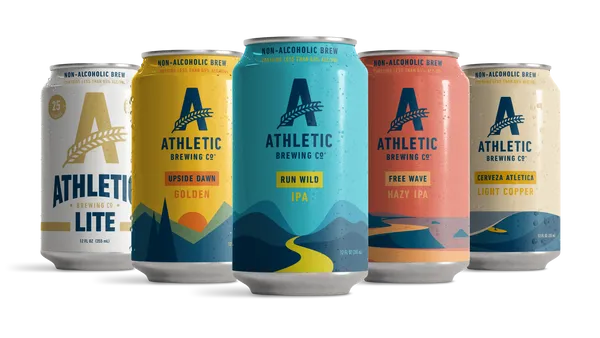Dive Brief:
- Athletic Brewing closed a $50 million equity financing round led by General Atlantic and multiple other existing investors. The new financing round values the company at around $800 million, according to The Wall Street Journal, roughly double its valuation from two years ago.
- The nonalcoholic beer maker plans to use the capital to grow its business, including through the recently announced purchase of a third U.S. brewing facility and the ongoing expansion of its product at retailers.
- Athletic, which started in 2018, is now America’s largest non-alcoholic brewery. It currently holds more than a 19% market share within nonalcoholic beer and is driving 32% of category growth, according to NielsenIQ data cited by the beverage maker.
Key performance indicators every CFO should watch
Dive Insight:
Athletic founder Bill Shufelt struggled at first to convince people in the industry to take a chance on his company. At a conference in 2017 with 10,000 brewers in Washington, D.C., Shufelt failed to generate even a single meaningful conversation with people skeptical about the segment’s prospects and was “laughed out of the conversations pretty quickly.”
Seven years later, his nonalcoholic beer company is rapidly expanding and having no trouble attracting investors. Athletic is ranked by the Brewers Association as the 10th largest U.S. craft brewery and 20th largest overall U.S. brewing company. Dollar sales are growing by more than 60 percent.
Keurig Dr Pepper is among Athletic’s major investors. The beverage giant purchased a minority stake in Athletic through a $50 million investment in 2022.
Athletic has invested more than $100 million on its beer production since its founding. In June, it purchased a 107,000-square-foot facility in San Diego across the street from its existing brewery for an undisclosed sum. Once operational, the new manufacturing plant will help Athletic double its capacity.
This new plant, and the latest $50 million investment, come as consumers are increasingly turning to nonalcoholic brews as they look to imbibe less or avoid the hangovers and higher caloric intake that come with consuming alcohol. According to recent polling highlighted by Athletic, 41% of Americans are actively trying to moderate their alcohol consumption in 2024, a 7% increase from 2023.
“We’re thrilled to welcome General Atlantic as a key growth partner at a time when we’re significantly expanding our West Coast capacity to meet increasing demand for Athletic beer,” Shufelt said in a statement. “We are passionate about transforming the way modern adults drink and converting critics into believers.”
Athletic is sold nationwide at more than 50,000 retailers and 25,000 on-premise venues. But as demand grows, both domestically and oversees, industry-leader Athletic will need to have the extra capacity to meet it and stay ahead of its rivals.
Just five years ago, top brands were absent from the market. Today, Blue Moon, Guinness, Corona, Heineken and Bud are among the brands with no- and low-alcohol versions of their popular brews. Shufelt told Food Dive earlier this year there were an estimated 150 non-alcoholic U.S. brands fighting for shelf space.


